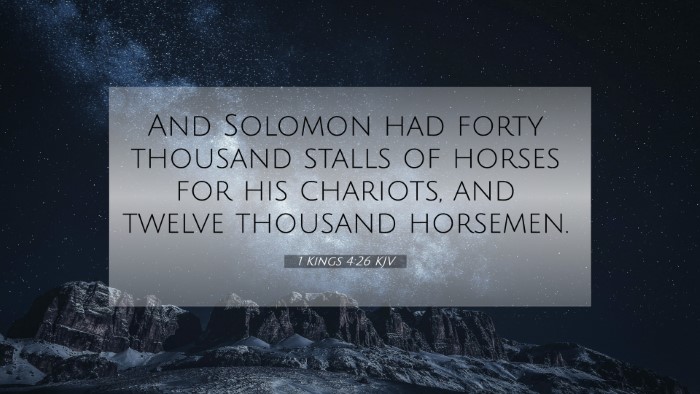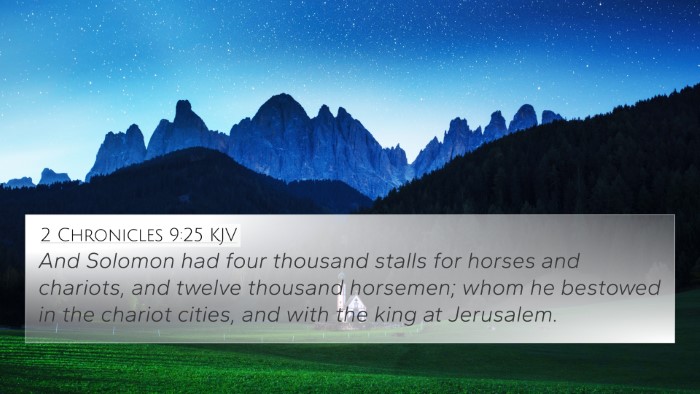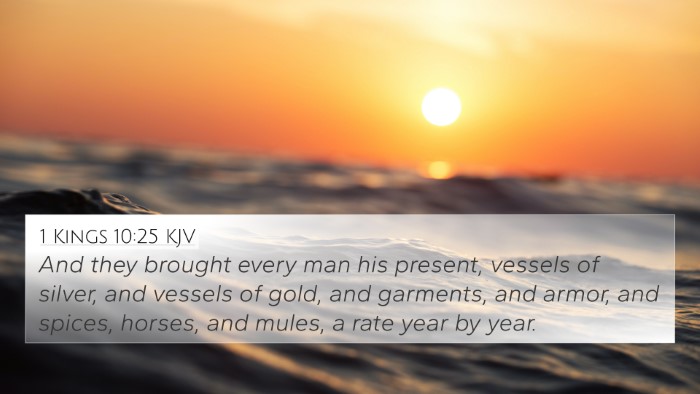Understanding 1 Kings 4:26
Verse Reference: 1 Kings 4:26 - "And Solomon had forty thousand stalls of horses for his chariots, and twelve thousand horsemen."
Summary of the Verse
This verse describes the extensive resources and military preparedness of King Solomon during his reign in Israel. The mention of forty thousand stalls for horses and twelve thousand horsemen highlights the majesty and strength of his kingdom.
Commentary Insights
-
Matthew Henry's Commentary:
Henry points out that the provision of such a large number of horses and chariots demonstrates Solomon's ability to maintain a formidable army. This was indicative of his wealth and power, as well as a reflection of the peace that allowed for prosperity and large-scale military organization.
-
Albert Barnes' Commentary:
Barnes elaborates on the significance of horses in the ancient Near East, where they were essential for chariots in warfare. Solomon's investment in such a vast number illustrates not only his military ambitions but also his desire to secure peace and maintain a powerful presence among rival nations.
-
Adam Clarke's Commentary:
Clarke provides insight into the cultural context of horses in this period, emphasizing their importance for trade and travel. The vast number of stalls suggests that Solomon was not only focused on military strength but also on economic stability, enabling trade and ensuring the prosperity of Israel.
Theological Implications
In the broader context of Scripture, Solomon's reign is often viewed as a high point in Israel’s history, symbolizing wealth, wisdom, and the fulfillment of God's promises to His people. This verse can lead to discussions about:
- The importance of leadership and resource management in the Bible.
- The relationship between military power and national security as seen throughout Biblical history.
- Explorations of God's blessings on those who seek wisdom, illustrated by Solomon's choices.
Bible Cross-References
1 Kings 4:26 connects with several other Scriptures that deepen our understanding of Solomon's reign and the themes of military readiness and prosperity. Here are some key cross-references:
- Deuteronomy 17:16: Discusses the prohibition against a king multiplying horses for himself.
- 2 Chronicles 1:14: Mentions Solomon’s accumulation of chariots and horsemen.
- Psalm 20:7: Affirms that some trust in chariots, but God's people trust in the name of the Lord.
- 1 Kings 10:26: Relates further details about Solomon’s wealth and military forces.
- Isaiah 31:1: Talks about the futility of relying on horses and chariots compared to trusting God.
- 1 Kings 10:28-29: Provides additional context on the trade of horses during Solomon’s reign.
- 1 Chronicles 18:4: Reports on David’s military triumphs, setting a precedent for Solomon's strength.
- Ecclesiastes 2:4-6: Solomon's reflections on the achievements made during his reign, including grand building projects.
- Proverbs 21:31: Speaks to the victory that comes from the Lord, implying the limits of human military might.
- Zechariah 10:3: God’s anger against the shepherds can be seen as a reflection of the necessity of righteous leadership for true security.
Conclusions
The details in 1 Kings 4:26 serve not just as historical facts but invite us to reflect on the nature of power, leadership, and divine favor in our lives. By cross-referencing this verse with others, we can gain a deeper insight into how God orchestrates history through leaders like Solomon. Such cross-referencing enriches our understanding of Biblical themes and the interconnectedness of Scripture.
Using Cross-References for Bible Study
For those engaging in Bible study, utilizing tools for cross-referencing can enhance our comprehension of passages. Here are some tips on how to effectively use Bible cross-references:
- Utilize a Bible concordance to locate verses that share themes or topics.
- Employ a cross-reference guide to find verses that are connected contextually or thematically.
- Consider the context of each verse—understanding the surrounding texts can provide clarity to individual passages.
- Incorporate cross-reference Bible study methods such as thematic studies where you explore interconnected verses on a specific subject.
Through such methodologies and insights, we can appreciate the richness of Scripture, enhancing personal faith and facilitating deeper discussions in study groups or sermons.








